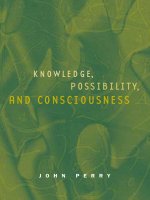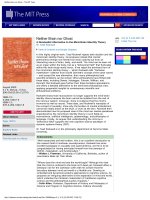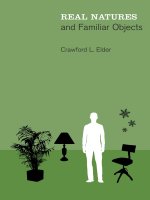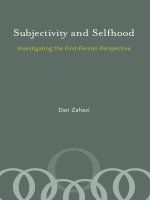the mit press natural ethical facts evolution connectionism and moral cognition oct 2003
Bạn đang xem bản rút gọn của tài liệu. Xem và tải ngay bản đầy đủ của tài liệu tại đây (915.82 KB, 227 trang )
Natural Ethical Facts
6750 FM UG 4/2/03 6:52 PM Page i
This page intentionally left blank
Natural Ethical Facts
Evolution, Connectionism, and Moral Cognition
William D. Casebeer
A Bradford Book
The MIT Press
Cambridge, Massachusetts
London, England
6750 FM UG 4/2/03 6:52 PM Page iii
© 2003 Massachusetts Institute of Technology
All rights reserved. No part of this book may be reproduced in any form by any
electronic or mechanical means (including photocopying, recording, or informa-
tion storage and retrieval) without permission in writing from the publisher.
Set in Sabon by UG / GGS Information Services, Inc. Printed and bound in the
United States of America.
Library of Congress Cataloging-in-Publication Data
Casebeer, William D.
Natural ethical facts : evolution, connectionism, and moral cognition /
William D. Casebeer.
p. cm.
Includes bibliographical references and index.
ISBN 0-262-03310-0 (alk. paper)
1. Ethics, Evolutionary. I. Title.
BJ1311.C37 2003
171'.7—dc21
2003042226
6750 FM UG 4/2/03 6:52 PM Page iv
The sharphoofed moose of the north, the cat on the housesill, the chickadee, the
prarie-dog,
The litter of the grunting sow as they tug at her teats,
The brood of the turkeyhen, and she with her halfspread wings,
I see in them and myself the same old law.
Walt Whitman, Leaves of Grass (1855)
Philosophy ought to imitate the successful sciences in its methods, so far as to
proceed only from tangible premises which can be subjected to careful scrutiny,
and to trust rather to the multitude and variety of its arguments than to the con-
clusiveness of any one. Its reasoning should not form a chain which is no
stronger than its weakest link, but a cable whose fibres may be ever so slender,
provided they are sufficiently numerous and intimately connected.
Charles S. Peirce, Some Consequences of Four Incapacities (1868)
6750 FM UG 4/2/03 6:52 PM Page v
This page intentionally left blank
Contents
Preface and Acknowledgements vii
1 Natural Ethical Facts 1
2 Clearing the Way for Reduction: Addressing
the Naturalistic Fallacy and the Open-Question Argument 15
3 The Functional Account of Ethics: Functional Explanation
in Biology and a Corresponding Account in Morality 37
4 Moral Judgment, Learning in Neural Networks,
and Connectionist Mental Models 73
5 Connectionism and Moral Cognition: Explaining
Moral Psychological Phenomena 101
6 Applications and Critique: Moral Theory,
Moral Practice, Moral Institutions 127
7 Objections and Conclusions: Nature and Norms 149
Notes 163
References 185
Index 211
6750 FM UG 4/2/03 6:53 PM Page vii
This page intentionally left blank
I have been told it is inappropriate to begin a paper or (heaven forbid) a
book with an apology. So: I apologize . . . not just for ignoring this piece
of advice, but also for attempting a project whose scope and nature pre-
cludes thorough examination in a single volume, let alone a whole series
of books. I beg your indulgence, and hope that by the end of the book
you will understand why I think writing it was necessary, despite its
myriad shortcomings and truncated discussions of theses that deserve a
far more elaborate defense.
Bringing this book to completion has been a distributed cognitive
enterprise of the first order. Many scholars have been involved in the
intellectual labor required to integrate the core ideas of the project into
an organic whole. In particular, Paul Churchland, Patricia Smith
Churchland, Jeff Elman, Georgios Anagnostopoulos, and Joan Stiles
were kind enough to read original drafts in their entirety when the proj-
ect was merely embryonic; they all provided useful feedback and
encouragement, and the structure of the book owes much to their
groundbreaking work in this area in the past decade. Paul and Pat
Churchland in particular have been sources of constant inspiration;
their willingness to see (with Paul’s mentor Wilfrid Sellars) how things
(in the largest sense) fit together (in the largest sense) is but one reason
why their philosophy about philosophy is and will continue to be instru-
mental in helping us cope with the challenges presented by the brain and
mind sciences. In addition, the scholars Larry Arnhart, William
Rottschaefer, Louis Pojman, P. D. Magnus, Wayne Martin, Carl Sachs,
Carl Ficarrotta, David Schiller, Joseph Cohen, David Barash, and Bill
Rhodes all provided useful critical feedback on pieces of the manuscript
at various stages. Of course, the factual errors and mistakes in reasoning
Preface and Acknowledgements
6750 FM UG 4/2/03 6:53 PM Page ix
that remain are all my own, while most of what is true and good in the
book is theirs. My thanks are also due to the excellent editorial staff at
The MIT Press, particularly Tom Stone and Paul Bethge, whose patience
and advice I very much appreciate.
Raising a family while writing a book can be problematic; I lovingly
thank my wife Adrianne for her intellectual and emotional support and
for the tremendous efforts she has placed into raising our three children
(Jonah, Mara, and Linnae) when I was otherwise preoccupied. My
greatest hope is that this project can contribute in some small way to
making the world that they and other children grow up to inhabit a
better, more sane place.
My heartfelt thanks to all those whose ideas and attitudes have other-
wise made their way into this book, particularly friends, philosophers,
and cognitive scientists from the University of California at San Diego,
the University of Arizona, and the United States Air Force Academy.
You know who you are—it’s an honor to be among your company.
Finally, I thank the United States Air Force (and, in turn, the American
taxpayer) for funding my graduate education, and for the daily reminder
that supporting and defending the U.S. Constitution is a worthy use of
heartbeats.
x Preface and Acknowledgements
6750 FM UG 4/2/03 6:53 PM Page x
Natural Ethical Facts
6750 FM UG 4/2/03 6:53 PM Page xi
This page intentionally left blank
1
Natural Ethical Facts
Why Care about Natural Ethical Facts?
Evolutionary biologists have been at work for more than 100 years
telling us about our nature as evolved, embodied creatures. Cognitive
scientists have been plumbing the depths of the mind for 50 years, dis-
covering the neural and computational roots of complex behavior and
cognition. For more than 2,000 years, moral philosophers have been
plugging away at big-picture normative theories regarding how we
ought to conduct ourselves and, ultimately, what the point of this
blooming and buzzing confusion of life and mind is. Until relatively
recently, however, work at the intersection of these three areas of
inquiry was difficult to find. Scientific theories of life and mind have had
relatively little contact with normative moral theory, and moral philoso-
phers, when they have made contact, have often expressed disappoint-
ment with the results. Why is this? What can we do to ensure that
fruitful consilience between our best theories in the cognitive sciences,
evolutionary biology, and ethics is the norm rather than the exception?
Addressing these issues by showing how there can be useful interactions
between science and ethics is the critical issue facing the sciences. As we
cast about for a post-Enlightenment normative anchor, if we are to pre-
vent backsliding into dogmatic supernatural and non-naturalistic con-
ceptions of the moral life, it is imperative that we demonstrate the
possibility of intelligent, useful interactions between the human sciences
and human ethics.
This book is an attempt to show that, theoretically speaking, there
is no reason to rule out a scientific naturalized ethics tout court, and
that, practically speaking, by taking into account recent developments in
6750 CH01 UG 4/2/03 6:53 PM Page 1
evolutionary biology and the cognitive sciences, the outlines of one
promising form of such an ethics can be sketched. It will be a pragmatic
neo-Aristotelian virtue theory, given substantive form by both concep-
tions of function from evolutionary biology and connectionist concep-
tions of thought from cognitive science. The rough structure of the book
follows from the unfolding of this admittedly synoptic thesis.
Moral Judgments, Connectionism, and the Cognitive and Biological
Sciences
The naturalization of ethics has been a problematic enterprise for moral
philosophers. Historically, there are several reasons why this is so. For
one, theoretical arguments regarding the impossibility of a systematic
reductive relationship between the natural realm and the normative
realm have stymied attempts to unify the two spheres by those sympa-
thetic to such a union. In addition, the cognitive capacities we use to
grasp moral knowledge have been thought by some to be far too subtle
for “mere” empirical explanation by a scientifically informed theory of
cognition. Finally, some previous attempts to construct a scientifically
informed moral theory, and thus remake ethics into a science, have been
too simplistic (or have been painted as such by critics) to do justice to
the full range of our considered moral intuitions and our reasonably
informed moral judgments. As a result, much of the work in the natural-
ization of morality has taken place in metaethics rather than in norma-
tive moral theory, leaving the latter bereft of empirical content. And
very little research has attempted to relate the latest findings of the cog-
nitive sciences to moral psychology and moral judgment, let alone nor-
mative moral theory, in any systematic fashion.
This isolation has had a debilitating effect on both the empirical plau-
sibility of normative moral theories and the societal impact of the bio-
logically informed cognitive sciences. Our normative moral theories
would be greatly enriched if the questions they posed were empirically
tractable, and the breadth of our cognitive and biological sciences would
be enhanced if they were to offer plausible reconstructions of our cogni-
tive capacity to reason about, grasp, and accede to moral norms. Such
an enrichment and enhancement also would pay dividends external to
the academic professions, giving us alternate strategies for framing and
2 Chapter 1
6750 CH01 UG 4/2/03 6:53 PM Page 2
resolving moral conflicts and allowing us to improve our methods for
cultivating moral knowledge by enhancing the effectiveness of our col-
lective character-development institutions.
My project embodies a synoptic reconciliation of the sciences of cog-
nition with a fully naturalized conception of morality. I argue that we
can improve our understanding of the nature of moral theory and its
place in moral judgment if we better understand just what morality con-
sists in. Such an understanding will best be informed by treating moral-
ity as a natural phenomenon subject to constraints from, influenced by,
and ultimately reduced to the sciences, particularly the cognitive sciences
and biology. Treating morality as a matter of proper function, biologi-
cally construed (e.g., at least partially fixed by our evolutionary history),
with a concomitant emphasis on skillful action in the world, will also
shed light on just what kind of creatures we must be (cognitively speak-
ing) if we are to possess knowledge about morality so taken. Connec-
tionist accounts of cognition can best accommodate this style of
knowledge and can also account for other gross moral psychological
phenomena, giving them ample explanatory power and making them
the centerpiece of moral cognition. The nature of morality and the pic-
ture of moral cognition I defend are rooted in a pragmatic construal of
knowledge and in a modern, biologically informed neo-Aristotelianism.
Exploring these roots, particularly as they manifest themselves in John
Dewey’s theory of moral deliberation, will shed light on the role of
moral theory in such a scheme and will help distinguish this approach
from less fruitful and more purely sociobiological undertakings. Finally,
I discuss objections and draw out some practical implications, regarding
the nature and form of our collective character-development institutions
and our methods for moral reasoning that arise from taking this
approach seriously.
The Way Forward
In chapter 2, I discuss and rebut two popular arguments against a reduc-
tive and naturalizable account of morality: the naturalistic fallacy and
the open-question argument. I contend that both arguments fail, primarily
because they rely on an outmoded analytic/synthetic distinction. Arguing
for a continuum of analytic and synthetic judgments, thus demonstrating
Natural Ethical Facts 3
6750 CH01 UG 4/2/03 6:53 PM Page 3
that moral knowledge and scientific knowledge are commensurable, will
open the way for a reductive naturalistic account of morality. I accom-
plish this by recapitulating W. V. O. Quine’s arguments against the
analytic/synthetic distinction. I also present the basics of Dewey’s theory
of moral deliberation, arguing that his conception of “ends-in-view”
effectively demonstrates the continuity of scientific and practical knowl-
edge with moral knowledge. The conception of morality I thus offer will
be cognitivist and realist but will nonetheless constraint our ability to
systematize moral theory. Moral conclusions, I will argue, follow abduc-
tively from properly construed non-normative premises. Our moral
judgments are part and parcel of our web of beliefs. If the proper reduc-
tive relationship between moral terms and natural terms is captured by a
theory that relates the two in a fecund way, then inferences from non-
normative premises to normative conclusions will not be excessively
licentious.
In chapter 3, I articulate the basics of such an approach, rebutting the
“error-theory” arguments against a moral science articulated by John
Mackie. Moral claims should be reduced to functional claims techni-
cally construed, hence the shared roots with an Aristotelian view of the
world. Such functional claims should be treated as they are in biology
and the life sciences, with a suitably modified Wright-style teleonomic
analysis: a Godfrey-Smith-flavored “modern-history” theory of func-
tions. Such a theory will thus take advantage of the explanatory power
of the neo-Darwinian synthesis. Some functional facts about human
beings fully fix normative claims; others will only constrain the possible
state space of moral options. A small percentage of the decisions we face
may have no effect at all on functional concerns, in which case we are
(morally speaking) simply free to choose. The basics of this account will
thus allow some flexibility in the normative structure of our lives. My
account also has the resources necessary to distinguish itself from hedo-
nistic, egoistic, desire-satisfaction, and utilitarian theories of morality,
particularly after I make some crucial distinctions (including the differ-
ence between proximate and distal functions and the difference between
ahistorical and historical functions). On this picture, moral facts are not
“queer” and unscientific, nor is morality globally relativistic and dra-
matically contingent. We can in good conscience be moral realists and
yet embrace an acceptable form of humility regarding our ability to
4 Chapter 1
6750 CH01 UG 4/2/03 6:53 PM Page 4
know the good; such humility reflects not only constraints on our cogni-
tive economy but also constraints on the form of norm-fixing evolution-
ary processes in nature. Ultimately, this approach makes empirical and
scientific investigation of moral normativity possible. I also examine
contemporary work done in the same vein, including more purely socio-
biological and Darwinian approaches to morality. I focus primarily on
modern accounts, ranging from Larry Arnhart’s theory to E. O. Wilson’s,
although I briefly discuss wrong-headed evolutionary ethical theories,
such as those offered by Herbert Spencer and the Social Darwinists. I dis-
cuss similarities and differences between these approaches and my own,
concluding that the account on offer has strengths that the other
approaches lack.
In chapter 4, I draw on resources from connectionist accounts of cog-
nition and from the embodied cognition movement to articulate a purely
biological notion of moral judgment that bridges the “normativity gap.”
Using resources from these two approaches, it becomes possible to spec-
ify a conception of judgment that harmonizes with the account of moral
knowledge discussed in chapter 3. A purely biological notion of judg-
ment is possible, and such a notion comports well with the idea of judg-
ment as the cognitive capacity to skillfully cope with the demands of the
environment. Thus, moral judgment is possible only in systems that
learn in a natural computational manner, whose nature is at least
momentarily fixed,
1
and that exist in an environment where demands
are placed upon the organism. Having good moral judgment amounts to
being able to accomplish cognitive tasks that enable one to meet the
demands of one’s functional nature. Morality is therefore a matter of
“knowing how” more than a matter of “knowing that.” Some of these
cognitive capacities can be captured in “representation-free” neural nets
that are best described in the language of dynamical systems theory; oth-
ers require traditional connectionist distributed representations. Some
advanced forms of moral reasoning may require a model-theoretic
account of reasoning. I discuss what mental models look like in connec-
tionism, postulate how they can accommodate more advanced aspects
of moral cognition, and point out their essential connection to action in
the world and embodiment in an organism. Certain high-level aspects of
connectionist mental models may lend themselves to a truth-functional
analysis rooted in a symbolic redescription of network activity, but such
Natural Ethical Facts 5
6750 CH01 UG 4/2/03 6:53 PM Page 5
a redescription will be possible only in certain instances and should not
be reified into a categorical demand placed upon normative action and
its associated psychology. I draw connections between this discussion
and Dewey’s account of moral deliberation, which I sketched in chapter 2.
I also offer a useful typology of moral characteristics that follows from
this account, distinguishing between those objects of science that are the
proper subjects of moral cum functional concerns, and between creatures
that are able to effectively model their environment and their relationship
to it (and that can hence formulate their own moral science). This gener-
ates a continuum among living things that have functions, ranging from
simple moral agents (for example, most insects) to maximally robust
moral reasoners (most social creatures with a significant range of behav-
ioral repertoires, especially—but not only—human beings).
In chapter 5, I use the explanatory power of a connectionist approach
to account for other gross features of moral reasoning. The interaction
of advances in connectionist accounts of thought and traditional issues
in moral cognition and psychology is an interesting one, as heretofore
disparate phenomena in the latter can be unified by an account from the
former. Connectionism can serve as a platform on which to reconstruct
several high-order moral cognitive phenomena, including moral knowl-
edge, moral learning and conceptual development, moral perception and
the role of metaphor and analogy in moral argument, the appearance of
staged moral development, the possibility of akrasia (acting against
one’s best considered judgment), the presence of moral systematicity,
moral dramatic rehearsal and moral motivation, and moral sociability.
A connectionist account of moral cognition best unifies the neurobiol-
ogy and cognitive psychology of morality and sheds new light on tradi-
tional issues in moral psychology, including questions about the
motivational efficacy of moral claims, the affective aspect of moral rea-
soning, and the importance of moral exemplars. I support these con-
tentions with reference to the exponentially increasing body of modeling
work in artificial neural networks. Finally, I briefly examine the litera-
ture relating brain structure and function to these models, identifying
key components of the several cognitive systems that jointly constitute
our capacity to be maximally robust moral reasoners.
In chapter 6, I draw together themes from the preceding five chap-
ters, examining how naturalizing morality by way of evolution and
6 Chapter 1
6750 CH01 UG 4/2/03 6:53 PM Page 6
connectionism may affect our moral theories, our moral practices, and
our moral institutions. Where does this attempt at reduction leave tradi-
tional moral theory? On the one hand, some aspects of moral theory—
particularly an appropriately naturalized Aristotle and large parts of
Dewey’s attempt to develop a pragmatic ethic—remain components of
the moral life; on the other hand, certain traditional moral theories do
not fare as well, at least if they are taken to be universally applicable.
A Kantian approach, for example, has at best heuristic value but at root
makes demands that are psychologically unrealistic. I conclude that it
functions well as a device for drawing attention to the strong conditions
necessary to enable social reasoning to occur, but that it fails to appro-
priately accommodate primary functional concerns. This pragmatic
approach recognizes a healthy limit to the usefulness of grand moral
theory: its existence can be explained, but its limits are outlined. Ethical
reasoning becomes a species of pure practical knowledge and as such is
responsive to the demands of the present. Just as pragmatic epistemol-
ogy is a process-oriented philosophy, so too is a pragmatic ethics that
draws on the useful portions of previous moral theorizing, insofar as
they are informed by and illuminate the issues raised by functional cum
biological concerns. This emphasis on proper function is rooted in an
Aristotelian account of the nature of humanity and requires the defense
of at least a “soft essentialism,” which I offer here by adverting to the
findings of the neo-Darwinian synthesis. Though we might think that
one of the primary lessons of Darwinism is that there is no such thing as
a species essence, I argue that population thinking serves as a healthy
corrective to the idea that our functions are immutable and that all of us
must possess exactly the same functional natures. I discuss the similari-
ties between this explicitly pragmatic approach and an Aristotelian
virtue ethic, arguing that the two are successfully unified with very little
remainder and that the neo-Darwinian synthesis can give biological
bite to Aristotle’s contentions about the limits of moral theorizing. I
conclude chapter 6 by using the aforementioned approach as a tool to
critique character-development institutions and to illuminate cases of
moral conflict. I address real-world case studies in ethics that demon-
strate how this conception has the ability to contend with these objec-
tions directly and not just abstractly. I focus first on whether an
individual should develop deep or wide friendships (modern-history
Natural Ethical Facts 7
6750 CH01 UG 4/2/03 6:53 PM Page 7
functions call for deep friendships) and second on how we should struc-
ture our societies (modern-history considerations lead to liberal demo-
cratic forms of organization). In more abstract and general terms, my
account restores an emphasis on habituation and mindfulness that our
social institutions would do well to attend to. I examine the implications
of this view for character development and moral education, arguing
that it propels to the forefront a narrative-driven case-study approach to
moral education, a solid grounding in the biological and sociological
dimensions of the human situation, a careful tending of the institutional
environment in which moral action is situated, a demand for consistency
between articulated principles and practical actions, and a healthy flexi-
bility in the practical application of rules and regulations. Nothing
teaches like experience, and so the proper environment for moral experi-
ence must be carefully cultivated and maintained by institutions of
moral education and character development. Such a process is demand-
ing and requires those engaging in it to stay informed of the results from
a large number of fields of empirical inquiry.
In chapter 7, I address the remaining objections to the aforementioned
approach and outline its additional strengths. It must answer some hard
questions usually put to more traditional sociobiological undertakings
that any naturalistic account of morality must deal with. Among the
grounds for concern are the perceived lack of robust and genuine nor-
mativity in the approach, some purportedly morally repugnant “entail-
ments” of the position, an argument that the position demands its own
rebuttal for heuristic “Platonic noble lie”-style reasons, and an argu-
ment that the position is empty of useful moral content. In the conclu-
sion of this chapter, I outline several areas where there is a notable
absence of empirical work or where more empirical work is needed;
these areas include the connectionist modeling of moral cognition,
applied moral cognitive psychology, moral anthropology, the neurobiol-
ogy of moral cognition, and biologically informed game-theoretic
approaches to skillful coping. I also discuss the need for further explo-
ration of more traditionally philosophic topics, such as alternatives to a
simple-correspondence account of cognition. A biological and neurobio-
logically informed pragmatic ethic holds the most hope for being the
unifying procedural glue that can successfully hold together otherwise
disparate and possibly mutually antagonistic approaches to the moral
8 Chapter 1
6750 CH01 UG 4/2/03 6:53 PM Page 8
life. Although moral progress using this approach is not a given, I high-
light its essentially optimistic character and hold out hope for reconcilia-
tion between the humanities and the sciences.
‘Naturalism’ and ‘Ethics’: Problematic Terms?
Before I begin my discussion of the naturalistic fallacy, there are several
terms whose use demands clarification so that the nature of this
approach is clear. These include ‘naturalism’ and ‘ethics’. (Entire books
have been written about the definition of these terms, so my discussion
will be concise.)
‘Naturalism’
The principal approach that I will use in the book is best typified as a
form of methodological naturalism, by which I mean that the method-
ological and epistemological assumptions of the natural sciences should
serve as standards for this inquiry. If at the end of the inquiry we feel
compelled to postulate the existence of a non-naturalistic entity or
process, so as to best explain the results of our study, then our method-
ological naturalism will have led us to a denial of ontological natural-
ism. However, I don’t think this will be the case, and for the moment we
should hold our methodological naturalism close so as to see if norma-
tivity can be derived without postulating “spooky” non-natural entities
(gods, a noumenal realm, and so on). Of course I will avail myself of the
ontologies postulated by the natural sciences during the course of this
inquiry, but this will be done with requisite sensitivity to moral experi-
ence, and with the fallibilistic view that the ontologies of our current
sciences might be wrong, so, although the project will presuppose onto-
logical naturalism to a certain extent, naturalist methodologies are still
the primary constraint.
Dewey (1902, p. 142) provides a nicely succinct definition of natural-
ism: “The theory that the whole of the universe or of experience may be
accounted for by a method like that of the physical sciences, and with
recourse only to the current conceptions of physical and natural science;
more specifically, that mental and moral processes may be reduced
to the terms and categories of the natural sciences. It is best defined
Natural Ethical Facts 9
6750 CH01 UG 4/2/03 6:53 PM Page 9
negatively as that which excludes everything distinctly spiritual or
transcendental. . . . ”
Some of the traditional methodological and ontological theses of nat-
uralism will be actively defended in this paper; others will be assumed.
For example, I will actively defend a realist conception of morality,
whereas I will simply assume that there are no miracles and there is no
extrasensory perception (at least until evidence demands that we change
these assumptions). In other words, my defense of certain traditional
tenets of naturalism will take place against the background of (a) uncon-
troversial findings from the sciences (e.g., no ESP), (b) controversial but
eminently defensible findings from the sciences (e.g., the explanatory
power of connectionist approaches to cognition), and (c) the interesting
points of conflict between fields of inquiry not generally considered to
be part of the sciences (e.g., certain assumptions about the nature of
ethical claims) and the sciences of cognition and life.
Gerhard Vollmer’s list of the traditional ontological and methodologi-
cal theses of naturalism (taken from his “Naturalism, Function, Teleon-
omy,” as published in Wolters 1995) is worth quoting in full:
A) Only as much metaphysics as necessary!
B) As much realism as possible!
C) For the investigation of nature, the method of empirical science is superior
to any other.
D) Nature (the world, the universe, the real) is, at bottom, constituted of matter
and energy, both temporally and causally.
E) All real systems—the universe as a whole included—are subject to develop-
ment, to evolution, to assembly, and disassembly. That’s why any modern natu-
ralism is an evolutionary naturalism.
F) Complex systems consist of and originate from less complex parts.
G) The real world is interconnected and quasi-continuous.
H) Instances transcending all human experience are conceivable, but dispens-
able for the consideration, description, explanation and interpretation of the
world.
I) There are no miracles.
J) There is no extrasensory perception.
K) Understanding nature doesn’t transcend nature itself.
L) There is a unity of nature which might be mirrored in a unity of science.
The naturalization of ethics would thus entail making ethics consistent
with this list of statements and thereby showing how knowledge of the
normative can be derived and justified using this methodology and
ontology. As Vollmer notes, every thesis on this list deserves explication
10 Chapter 1
6750 CH01 UG 4/2/03 6:53 PM Page 10
and refinement, but I hope they are intelligible without this and that
they serve as useful guideposts for present purposes.
Jay Garfield (2000, p. 423) distinguishes between strong naturalism
and moderate naturalism. Strong naturalism requires more than mere
consistency (which is demanded by even the weakest forms of natural-
ism); it also requires entailment or some form of reduction to more fun-
damental and already unproblematically naturalized theories. Moderate
naturalism would require (1) consistency, (2) that the research be guided
by the methodological canons of the sciences, and (3) that there be (in
Garfield’s words) “plausible explanatory strategies for linking the theo-
ries, explanations and theoretical perspectives” of the body of knowl-
edge being naturalized to the remainder of science. In my case, I will be
happy if I achieve a moderate naturalization, but I keep in mind the goal
of strong naturalization as a regulative ideal. This reflects my suspicion
that mere supervenience relations, though acceptable in a developing
science, often are used as an excuse not to explore the phenomena in
question in more depth, or, in the worst of cases, merely restate a prob-
lematic relation rather than “solving” it.
2
In sum, we should expect that a plausible naturalization of ethics
would explain the essential nature of moral judgments, their subject
matter, and how we come to make them. Such a naturalization would
make full use of background knowledge from the sciences, especially (at
least in the case of this book) from the cognitive sciences and evolution-
ary biology.
The Natural Method
Keeping the background knowledge of the pertinent sciences in mind
while constructing a theory has been given a name by Owen Flanagan:
the Natural Method.
3
Though Flanagan uses it to triangulate on a the-
ory of the nature of the mind (paying attention to results from the asso-
ciated departments of the cognitive sciences, as well as to first-person
phenomenology), there is no principled reason why the process couldn’t
be applied to any phenomenon of interest. Flanagan (2000, p. 14) char-
acterizes the Natural Method as follows: “The idea is to keep one’s eye,
as much as is humanly possible, on all the relevant hypotheses and data
sources at once in the attempt to construct a credible theory. The
Natural Ethical Facts 11
6750 CH01 UG 4/2/03 6:53 PM Page 11
natural method involves seeking consistency and equilibrium among dif-
ferent modes of analysis applied to the study of some . . . phenomenon.”
Flanagan’s prescription derives in part from Quinean considerations
about confirmatory holism. Insofar as these considerations also drive
my inquiry (as will become evident at the end of chapter 2), it is no sur-
prise that the method I advocate for framing theories of morality is, in
essence, the Natural Method.
Two Desiderata for Naturalization
To summarize the desiderata for naturalism (for comparison to the con-
clusions of chapter 7), naturalizing ethics would therefore consist in pro-
ducing (1) an account of moral normativity that roots normativity in
nature, where the content of nature’s ontology is (provisionally
4
) pro-
vided by the methodological canons of the natural sciences, and (2) an
account of our capacity to grasp and accede to these norms that is
rooted in the best theoretical frameworks that the mind sciences have
to offer.
‘Ethics’
What does the subject matter of the study of morality consist in?
Broadly speaking, it is the study of what we ought to do, what we ought
to intend, or what kind of people we ought to be, all in the largest
sense—how ought we live our lives? The three traditional theoretical
approaches to ethics have been thought to answer these questions in
turn: utilitarianism
5
focuses primarily on the consequences of actions (as
they relate to the production of pleasure and the reduction of pain),
deontology
6
concentrates on what duties we owe to one another (and, in
its most famous Kantian version, on what duty-filtered maxims or inten-
tions we ought to form in our minds), and virtue theory
7
considers what
states of character we ought to cultivate in ourselves. In the course of
this book, I discuss all three of these theories as they relate to naturaliza-
tion, particularly virtue theory.
There are many more fine-grained distinctions to be made here, begin-
ning with the difference between instrumental reasoning and reasoning
12 Chapter 1
6750 CH01 UG 4/2/03 6:53 PM Page 12









